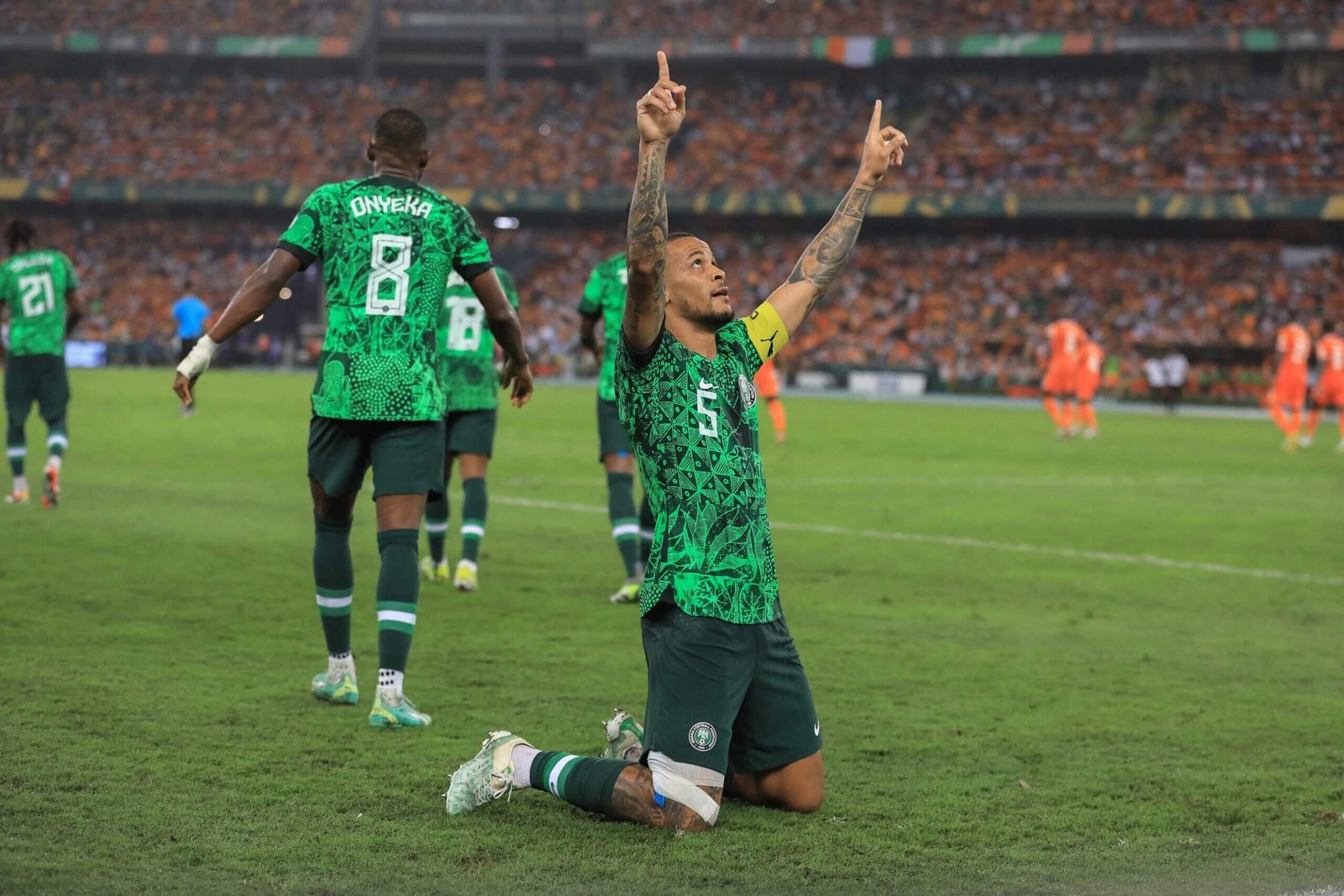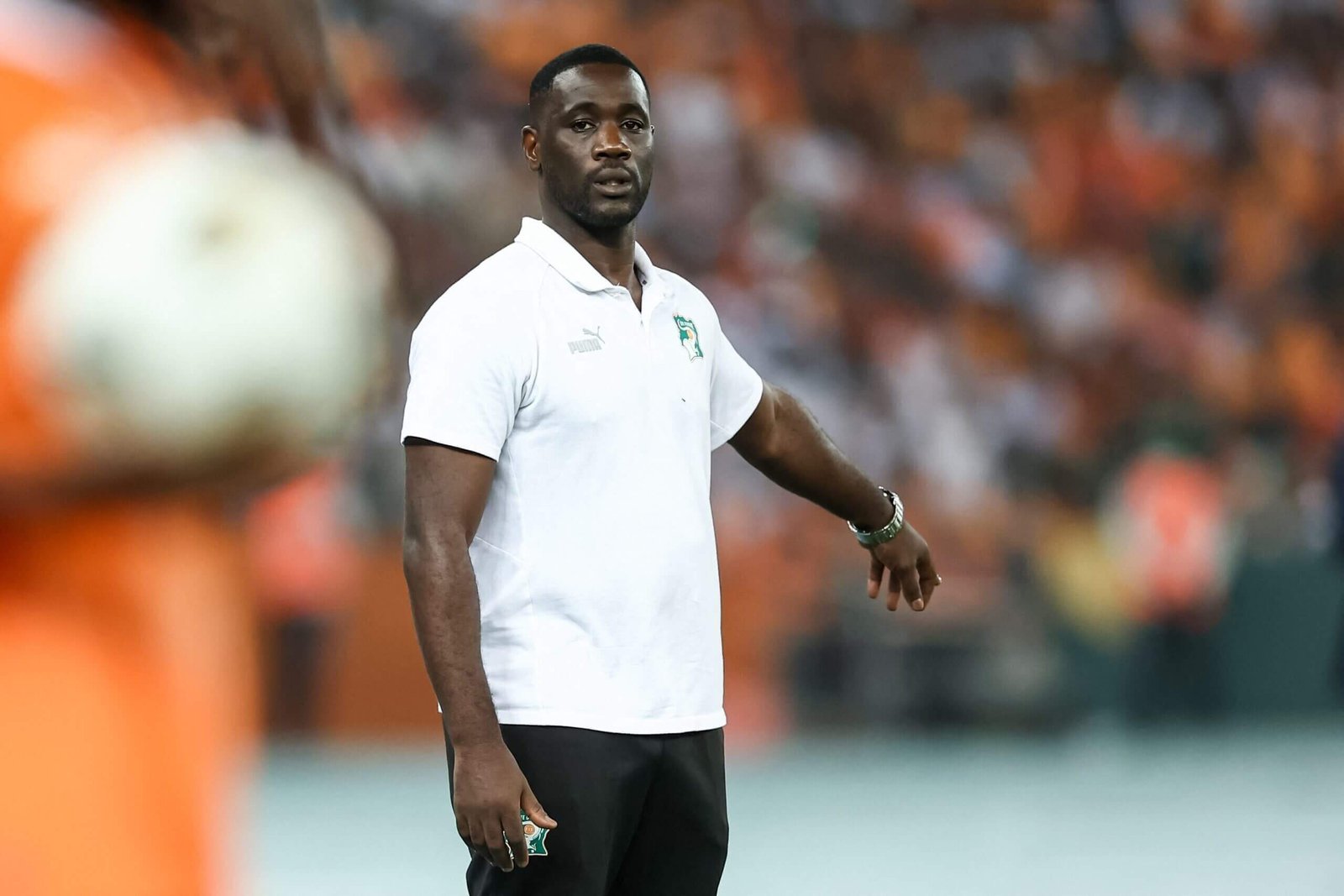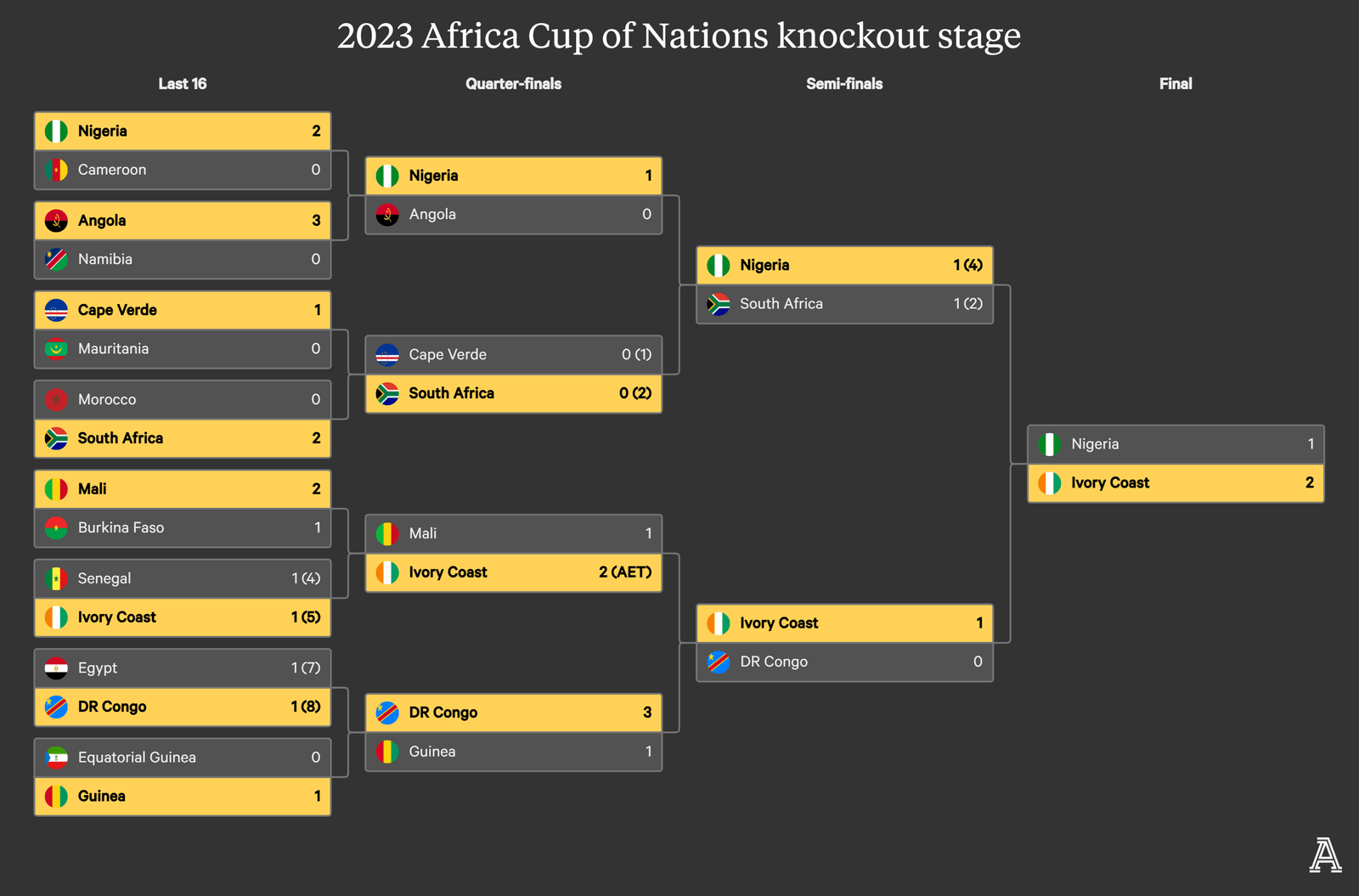Ivory Coast won the Africa Cup of Nations in dramatic fashion after Sebastien Haller’s skillful close-range finish sealed their comeback against Nigeria.
The host nation, who sacked their manager after the groups and repeatedly came back from the brink of elimination, have secured a famous triumph that will have the people of Ivory Coast dancing long into the night.
Nigeria took the lead through William Troost-Ekong’s first-half header before Franck Kessie equalised in the 62nd minute for Ivory Coast. The stage was then set for Borussia Dortmund’s Haller to strike and break Nigerian hearts with just under 10 minutes to play.
Here, our writers analyse and evaluate the key talking points from the game.
Haller’s winner is one for the ages
It is the moment Sebastien Haller would have been dreaming about 18 months ago, when he was in hospital receiving treatment to remove a testicular tumour.
In the 81st minute, the 29-year-old poked home Simon Adingra’s cross and sent the Alassane Ouattara Stadium wild.
Haller celebrates his winner (ISSOUF SANOGO/AFP via Getty Images)
Haller nearly missed out on this competition due to an ankle injury. He flew out to Ivory Coast a couple of weeks before the rest of the squad linked up to work on his fitness. The forward missed all of their group-stage games and made his return as a substitute in the last 16 against Senegal.
Yet Haller can still make a strong claim for being the most influential player at this tournament. His clever pass led to Nicolas Pepe winning a penalty against Senegal and the team were transformed when he was introduced in the quarter-final victory over Mali. And then his volley in the semi-final secured Ivory Coast their place in the final.
Ivory Coast’s game plan against Nigeria was centred around launching the ball into the box as much as possible for him to attack.
Nigeria had to learn a lesson from the first half and cut the danger out at source. They never did and you can only give Haller so many opportunities before he will punish you.
Jay Harris
Brilliant Troost-Ekong can hold head high
Nigeria came into this year’s AFCON boasting an array of attacking talents, but their triumph came down to defensive resilience, with the Super Eagles conceding just twice on their way to the final.
Key to this was Troost-Ekong, who as well as being a rock at the back, finishes the tournament with two more goals than Victor Osimhen, the reigning African Footballer of the Year, and the same number as Nigeria’s other attacking star Ademola Lookman.
The side’s captain towered over Serge Aurier to head his team ahead in the 38th minute of the final. It was his third goal of the tournament and each one has been absolutely vital.
A goal in the group-stage win over Ivory Coast helped convince manager Jose Peseiro that the 3-4-3 shape he was using was worth continuing with.
Troost-Ekong, 30, then held his nerve to score a penalty against South Africa in the semi-finals and this header helped his side shift first-half momentum from the hosts.

Troost-Ekong celebrates his goal (DANIEL BELOUMOU OLOMO/AFP via Getty Images)
Factor in the role he has played in Nigeria’s four clean sheets en route to the final and one could argue his performance has been the best by a centre-back at an international tournament since Carles Puyol for Spain at the 2010 World Cup.
Overall, Troost-Ekong has scored five goals at the Africa Cup of Nations, the most by a centre-back in history.
Peseiro’s approach to Sunday’s final saw 3-4-3 give way to a 5-4-1. Central midfielders Alex Iwobi and Frank Onyeka prioritised turnovers ahead of line-breaking passes, while Ola Aina locked down the dangerous Simon Adingra.
Ivory Coast got some joy from Max Gradel down the right wing, but Calvin Bassey’s no-nonsense approach to tackling paid off.
It wasn’t pretty, but it was sensible football for a final. Unfortunately for Troost-Ekong and Nigeria though, they couldn’t quite get over the line.
Carl Anka
Ivory Coast’s miracle redemption arc is complete
Their supporters have taken to calling Ivory Coast “les Revenants” — the Zombies.
The host country came back from the dead this tournament — repeatedly. On the brink of a humiliating group-stage exit, they sacked coach Jean-Louis Gasset after their final first-round game.
Two days earlier, they had lost 4-0 to minnows Equatorial Guinea. Replacement Emerse Fae had never managed a senior game before, at any level — yet here he was, parachuted into the most high-pressure job on the continent.
He brought inexperience, but with it came belief. Several results conspired to send Ivory Coast into the knockout stage — before they shocked defending champions Senegal on penalties in the last 16.
Two late goals saw them through in their quarter-final against Mali, first a 90th-minute equaliser, before an improvised flick from Oumar Diakite in the closing seconds of extra time avoided another shootout.

Fae on the touchline (FRANCK FIFE/AFP via Getty Images)
In theory, the 1-0 semi-final win over DR Congo was their most straightforward over the tournament — but seeing as goalscorer Sebastien Haller had begun 2023 by entering remission from testicular cancer, it featured its own, wider comeback.
And so to Abidjan, the final, and a chance to win their third AFCON title, and first since 2015. Front runners in the early stages, they took up their accustomed position after William Troost-Ekong’s 38th-minute header.
Nigeria had not lost a game in which they took the lead in their last 19 matches — but Franck Kessie’s header brought them back to parity after 62 minutes.

Haller had returned to the pitch last year after his cancer diagnosis with boots reading “F**k Cancer”. Now, with that same right foot, he delivered AFCON glory. Ivory Coast, the Zombies, back from the dead.
Jacob Whitehead
Half-fit Osimhen battles to the end but it is not enough
Victor Osimhen is a human cyclone. If you are a defender, you cannot avoid him. His arms and legs are after you. He will come at you with his head.
Yet any striker is often only as effective as the service he receives. Throughout this tournament, Nigeria coach Peseiro has got his tactics right. His team has played counter-attacking football, bypassing a midfield that does not have any passers.

Osimhen goes down during the final (ISSOUF SANOGO/AFP via Getty Images)
Osimhen had to fight to create his own chances, with Nigeria’s fast wide players feeding off his effort. It ultimately led to him scoring just one goal but without Osimhen’s courage and running, Nigeria would never have made it to the final.
This was a brutal game of football played at the end of the hottest day of the tournament. This did not stop Osimhen. Neither did the scraps he was working with, or the injuries he was suffering from. It was agonising watching him trying to complete the match when it was in his own interests as well as the team’s for him to leave the pitch.
Simon Hughes
Recommended reading
(Top photo: DANIEL BELOUMOU OLOMO/AFP via Getty Images)
Read the full article here


